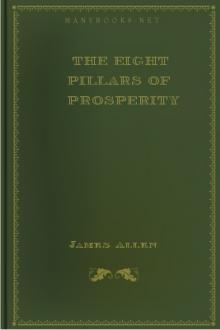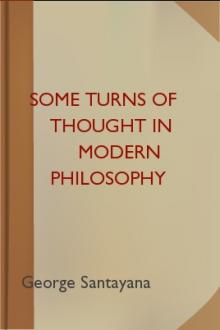The Eight Pillars of Prosperity - James Allen (top rated books of all time txt) 📗

- Author: James Allen
- Performer: -
Book online «The Eight Pillars of Prosperity - James Allen (top rated books of all time txt) 📗». Author James Allen
Power goes with penetration. An understanding of the nature of actions is accompanied with the power to meet and deal with all actions in the right and best way. Knowledge is always power, but knowledge of the nature of actions is superlative power, and he who possesses it becomes a Presence to all hearts, and modifies their actions for good. Long after his bodily presence has passed away, he is still a moulding force in the world and is a spiritual reality working subtly in the minds of men, and shaping them towards sublime ends. At first his power local and limited, but the circle of righteousness which he has set moving, continues to extend and extended till it embraces the whole world, and all men are influenced by it.
The sincere man stamps his character upon all that he does, and also upon all people with whom he comes in contact. He speaks a word in season, and some one is impressed; the influence is communicated to another, and another, and presently some despairing soul ten thousand miles away hears it and is restored. Such a power is prosperity in itself, and its worth is not to be valued in coin. Money cannot purchase the priceless jewels of character, but labour in right doing can, and he who makes himself sincere, who acquires a robust soundness throughout his entire being, will become a man of singular success and rare power.
Such is the strong pillar of sincerity. It supporting power is to great that, one it is completely erected, the Temple of Prosperity is secure. Its walls will not crumble; its rafters will not decay; its roof will not fall in. It will stand while the man lives, and when has passed away it will continue to afford a shelter and a home for others through many generation.
Chapter 8. Seventh pillar - Impartiality
To get rid of prejudice is a great achievement. Prejudices piles obstacles in a man’s way - obstacles to health, success, happiness, and prosperity, so that he is continually running up against imaginary enemies, who, when prejudice is removed, are seen to be friend. Life, indeed, a sort of obstacle race to the man of prejudice, a race wherein the obstacles cannot be negotiated and the goal is not reached; whereas to the impartial man life is a day’s walk in a pleasant country, with refreshment and rest at the end of the day.
To acquire impartiality, a man must remove that innate egotism which prevents him from seeing any thing from any point of view other than this own. A great task, truly; but a notable, and one that can be well begun now, even if it cannot be finished. Truth can “remove mountains”, and prejudice is a range of mental mountains beyond which the partisan does not see, and of which he does not believe there is any beyond. These mountains removed, however, there opens to the view the unending vista of mental variety blended in one glorious picture of light and shade, of colour and tone, gladdening beholding eyes.
By clinging to stubborn prejudice what joys are missed, what friends are sacrificed, what happiness is destroyed, and what prospects are blighted! And yet freedom from prejudice is a rare thing. There are few men who are not prejudiced partisans upon the subjects which are of interest to them. One rarely meets a man that will dispassionately discuss his subject from both sides, considering all the facts and weighing all the evidence so as to arrive at truth on the matter. Each partisan has his own case to make out. He is not searching for truth, for he is already convinced that his own conclusion is the truth, and that all else is error; but he is defending his own case, and striving for victory. Neither does he attempt to prove that he has the truth by a calm array of facts and evidence, but defends his position with more or less heat and agitation.
Prejudice causes a man to form a conclusion, sometimes without any basis of fact or knowledge, and then to refuse to consider anything which does not support that conclusion; and in this way prejudice is a complete barrier to the attainment of knowledge. It binds a man down to darkness and ignorance, and prevents the development of his mind in the highest and noblest directions. More than this, it also shuts him out from communion with the best minds, and confines him to the dark and solitary cell of his own egotism.
Prejudice is a shutting up of the mind against the entrance of new light, against the perception of more beauty, against the hearing of diviner music. The partisan clings to his little, fleeting, flimsy opinion, and thinks it the greatest thing in the world. He is so in love with his own conclusion (which is only a form of self love), that he thinks all men ought to agree with him, and he regards men as more or less stupid who do not see as he sees, while he praises the good judgement of those who are one with him in his view. Such a man cannot have knowledge, cannot have truth. He is confined to the sphere of opinion (to his own self created illusions) which is outside the realm of reality. He moves in a kind of self infatuation which prevents him from seeing the commonest facts of life, while his own theories - usually more or less groundless - assume, in his mind, overpowering proportions. He fondly imagines that there is but one side to everything, and that side is his own. There are at least two sides to everything, and he it is who finds the truth in a matter who carefully examines both sides with all freedom from excitement, and without any desire for the predominance of one side over another.
In its divisions and controversies the world at large is like two lawyers defending a case. The counsel for the prosecution presents all the facts which prove his side, while counsel for the defense presents all the facts which support his contention, and each belittles or ignores, or tries to reason away, the facts of the other. The Judge in the case, however, is like the impartial thinker among men: having listened to all the evidence on both sides, he compares and sifts it so as to form an impartial summing up in the cause of justice.
Not that this universal partiality is a bad thing, nor as in all other extremes, nature here reduces the oppositions of conflicting parties to a perfect balance; moreover, it is a factor in evolution; it stimulates men to think who have not yet developed the power to rouse up vigorous thought at will, and it is a phase through which all men have to pass. But it is only byway - and a tangled, confused and painful one - towards the great highway of Truth. It is the are of which impartiality is the perfect round. The partisan sees a portion of the truth, and thinks it the whole, but the impartial thinker sees the whole truth which includes all sides. It is necessary that we find see truth in sections, as it were, until, having gathered up all the parts, we may piece them together and form the perfect circle, and the forming of such circle is the attainment of impartiality.
The impartial man examines, weighs, and considers, with freedom from prejudice and from likes and dislikes. His one wish is to discover the truth. He abolishes preconceived opinions, and lets facts and evidence speak for themselves. He has no case to make out for himself, for he knows that truth is unalterable, that his opinions can make no difference to it, and that it can be investigated and discovered. He thereby escapes a vast amount of friction and nervous wear and tear to which the feverish partisan is subject; and in addition, he looks directly upon the face of Reality, and so becomes tranquil and peaceful.
So rare is freedom from prejudice that wherever the impartial thinker may be, he is sure, sooner or later, to occupy a very high position in the estimation of the world, and in the guidance of its destiny. Not necessarily an office in worldly affairs, for that is improbable, but an exalted position in the sphere of influence. There may be such a one now, and he may be a carpenter, a weaver, a clerk; he may be in poverty or in the home of a millionaire; he may be short or tall, or of any complexion, but whatever and wherever he may be, he has, though unknown, already begun to move the world, and will one day be universally recognized at a new force and creative centre in evolution.
There was one such some nineteen hundred years ago. He was only a poor, unlettered carpenter; He was regarded as a madman by His own relatives, and he came to an ignominious end in the eyes of His countrymen, but He sowed the seeds of an influence which has altered the whole world.
There was another such in India some twenty five centuries ago. He was accomplished, highly educated, and was the son of a capitalist and landed proprietor a petty king. He became a penniless, homeless mendicant, and to day one third of the human race worship at his shrine, and are restrained and elevated by his influence.
“Beware when the great God lets loose a thinker on this plane,” says Emerson; and a man is not a thinker who is bound by prejudice; he is merely the strenuous upholder of an opinion. Every idea must pass through the medium of his particular prejudice, and receive its colour, so that dispassionate thinking and impartial judgement are rendered impossible. Such a man sees everything only in its relation, or imagined relation, to his opinion, whereas the thinker sees things as they are. The man who has so purified his mind of prejudice and of all the imperfections of egotism as to be able to look directly upon reality, has reached the acme of power; he holds in his hands, as it were, the vastest influence, and he will wield this power whether he knows it or not; it will be inseparable from his life, and will go from him as perfume from the flower. It will be in his words, his deeds, in his bodily postures and the motions of his mind, even in his silence and the stillness of his frame. Wherever he goes, even though he should fly to the desert, he will not escape this lofty destiny, for a great thinker is the centre of the world; by him all men are held in their orbits and all thought gravitates towards him.
The true thinker lives above and beyond the seething whirlpool of passion in which mankind is engulfed. He is not swayed by personal consideration, for he has grasped the importance of impersonal principles, and being thus a noncombatant in the clashing warfare of egotistic desires, he can, from the vantage ground of an impartial but not indifferent watcher, see both sides equally, and grasp the cause and meaning of the fray.
Not only the





Comments (0)